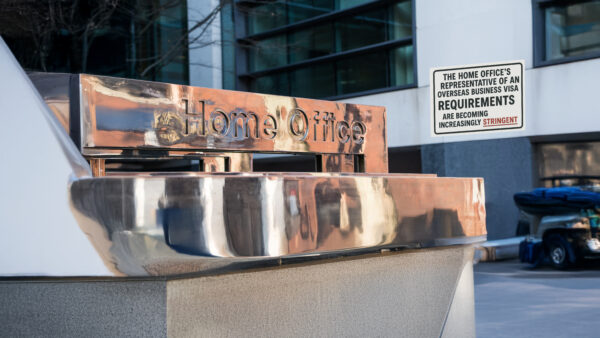Latest Posts

Representative of an Overseas Business Visa (Extension / Settlement) – The Home Office’s Increasingly Stringent Requirements
The representative of an Overseas Business visa has long been an essential route for overseas businesses looking to establish a presence in the UK. However, with the route now closed to new applicants, those seeking extensions or settlement under this category are facing an increasingly strict scrutiny process from the Home Office.
Immigration practitioners, myself included, have observed a notable shift in the level of detail being demanded from applicants. Many are being called for interviews, and refusals are becoming more common. The Home Office’s approach suggests that they are keen to ensure that only genuine representatives of overseas business continue to benefit from this route. Consequently, they are requesting extensive documentation, much of which is neither explicitly listed in the Immigration Rules nor mentioned in official guidance. This applies regardless of whether you are applying for an extension or settlement.
The Expanding List of Documentation Requests
Beyond the standard supporting evidence, the Home Office is now demanding a wide range of additional business and financial records, often requiring significant time to compile. The Home Office places significant emphasis on assessing whether the UK branch or subsidiary maintains active contracts and a client base within the UK, demonstrating its continued commercial viability and relevance in the market.
Commonly requested documents include:
- Detailed descriptions of business activities, contracts, and invoices from UK clients.
- Proof of financial transactions, financial statements, invoices, and VAT returns.
- Proof of business premises, including tenancy agreements and photographs.
- Employment records for UK-based staff, including job descriptions, contracts, payslips, PAYE and RTI reports.
- A full breakdown of the applicant’s role, detailing day-to-day duties and responsibilities in the UK.
- Advertising and promotional materials, such as website content and marketing documents, and public-facing communications.
- Overseas business documents, including Memorandum of Association, Articles of Association, shareholding details, and proof of active trading.
This is by no means an exhaustive list, but it highlights the extent to which applicants must now be prepared to substantiate their role and the legitimacy of the UK business.
Home Office Deadlines and the Importance of Preparation
The Home Office typically provides 10 working days to supply additional documentation once requested. However, it is possible to request an extension if more time is needed. That said, it is always advisable to be fully prepared in advance to avoid rushing and potentially overlooking critical details.
The last thing you want is to be pushed into an interview stage due to incomplete or unclear documentation. These interviews can be tricky and exhausting, often leading to further scrutiny or complications that could impact your application outcome. Avoiding an interview wherever possible should be a key objective, and thorough preparation is the best way to achieve this.
Why Is the Home Office Taking a Harder Stance?
The increased level of scrutiny appears to stem from a desire to tighten compliance and prevent misuse of the visa system. As the route is now closed to new applicants, the Home Office likely views extensions and settlement applications as an opportunity to reassess whether those already in the UK still meet the eligibility criteria.
Unfortunately, some applicants are unprepared for the depth of investigation that now accompanies an extension or settlement applications. Even legitimate businesses with genuine UK operations can face difficulties if their documentation does not fully align with what the Home Office expects to see.
Seek Professional Legal Guidance
Given the complexity and unpredictability of these document requests, seeking expert legal assistance is more crucial than ever. A well-prepared application, supported by the right evidence, significantly reduces the risk of delays, interviews, or refusals.
As an immigration lawyer, I have successfully guided numerous clients through this challenging process, ensuring they provide the necessary documentation while avoiding unnecessary pitfalls. My advice to any Sole Representative visa holder is simple: do not take your extension or settlement application lightly. Even if your business is fully compliant, failing to anticipate the Home Office’s demands can put your immigration status at risk.
If you are preparing to extend your visa or apply for settlement, now is the time to get expert advice. The stakes are high, and the margin for error is smaller than ever. Reach out to ensure that your case is presented in the strongest possible light, before the Home Office puts your business under the microscope.
Read More
Celebrating New Promotions and Milestones at Quastels
At Quastels, the strength of our firm lies in the outstanding individuals who drive innovation, deliver exceptional client service, and embody our values. We are delighted to announce a series of well-deserved promotions that reflect the continuing growth of our practice and the bright future ahead.
Lin Li
Lin Li has been promoted to Senior Associate in our Immigration team. Lin is highly regarded for her technical expertise across a wide range of immigration matters, including complex corporate immigration, family visas, British nationality applications, and sponsor licences. Fluent in Mandarin and Cantonese, Lin has build a reputation for her client-centric approach, guiding both businesses and individuals through the evolving UK immigration landscape with skill and empathy. Her promotion recognises her outstanding contributions to the firm’s expanding immigration practice.
Ann Goh
Ann Goh has been promoted to Associate in our Litigation and Dispute Resolution Department. As a key member of the team, Ann advises on a broad spectrum of general commercial and insolvency matters, including contractual disputes of all kinds, civil fraud, company and partner disputes, and insolvency and restructuring. She is regularly instructed in complex/multi-jurisdictional matters and is consistent in delivering results for her clients. Ann’s promotion reflects not only her continued commitment to excellence but also her growing influence within the team and the depth of expertise within our disputes practice.
Florence Wilson-Gunn
We are equally proud to announce that Florence Wilson-Gunn has qualified as a Solicitor and joins our Dispute Resolution team following the successful completion of her training contract at Quastels. Florence has worked across a number of departments during her training, gaining wide-ranging experience and demonstrating exceptional diligence, adaptability, and a clear passion for dispute resolution. We are excited to see Florence continue to develop her practice as she embarks on this next stage of her career with us.
These promotions are a testament to the extraordinary calibre of our team at Quastels. We are committed to investing in the growth and development of our people as part of our long-term strategy to remain a destination firm for both talented lawyers and clients seeking cutting-edge legal advice.
Congratulations to Lin, Ann, and Florence on these well-earned milestones. We are excited for what the future holds.
Read More
Key UK Immigration Updates for 2025: What You Need to Know
In 2025, the UK government remains focused on refining its immigration framework, prioritising skills-based immigration, streamlining application processes, and strengthening border security. A series of significant updates have been introduced to the immigration system, aiming to meet the evolving needs of the UK economy while maintaining national security. Below are the key changes to the immigration system and their implications for visitors, skilled workers, employers, global talent, families, and UK residents.
1. eVisa and Digital Immigration Status
The UK is moving to a fully digital immigration system, eliminating the need for physical documents like BRC and BRP. Immigration status will be accessible digitally via eVisa platforms.
However, due to ongoing technical issues, the Home Office has extended the grace period for BRPs and BRCs until 1 June 2025 for travel purposes. It is advisable to retain these documents and carry a printout of your visa approval letter, showing the expiry date, as secondary evidence.
While the grace period exists, an estimated 600,000 people still need to create their UKVI account to access their eVisa. If you fall within this group, you are strongly urged to act now by transitioning to eVisa at the earliest opportunity, as well as ensuring your passport details are updated in your UKVI account before travel.
2. Electronic Travel Authorisation (ETA)
The UK has implemented an Electronic Travel Authorisation (ETA) system for visitors from visa-exempt countries, including the USA, Canada, Australia, New Zealand, Japan, South Korea, Hong Kong (excluding BNO passport holders), Malaysia, the UAE, and others.
From 2 April 2025, nationals from EU/EEA countries and Switzerland will also be required to obtain an ETA to visit the UK. The current cost of an ETA is £10, with plans to increase it to £16 in the future. The ETA permits multiple entries to the UK, allowing stays of up to six months at a time for up to two years or until the holder’s passport expires—whichever comes first. Importantly, there is no “6-month in 12 months” rule, each visit simply cannot exceed the six-month maximum.
3. EU Settlement Scheme (EUSS) – Automatic Conversion of Pre-Settled to Settled Status
The Home Office has implemented a streamlined process for eligible holders of EUSS Pre-Settled Status without the need for an application to be submitted. Several thousand individuals have already been successfully transitioned to Settled Status through automated checks, and they will be notified of their status change or provided with further instructions if they are ineligible. This process will expand further throughout the year.
While the conversion will occur in phases, individuals eligible for Settled Status are advised to apply early to avoid delays. A key benefit of obtaining Settled Status is the ability to apply for British citizenship, as applicant must have held Settled Status for at least 12 months before applying (unless married to a British citizen).
4. Skilled Workers
The Skilled Worker visa remains the primary route for employment in the UK, designed to address labour shortages post-Brexit and attract skilled professionals. Operating on a points-based system, it assesses applicants based on qualifications, salary, and English proficiency.
Top Industries for Skilled Worker Visas in 2024
- Healthcare & Social Work – The largest share of skilled worker visas went to nurses, doctors, and social care workers, reflecting the urgent demand in these sectors.
- Information Technology (IT) – A strong demand persists for software developers, cybersecurity specialists, and data analysts, with ongoing skill gaps in the sector.
- Engineering – Although no longer on the shortage occupation list, civil, mechanical, and electrical engineers continue to receive a significant number of visas due to industry demand.
- Construction – Skilled trades such as electricians, plumbers, and project managers remain crucial for ongoing infrastructure projects.
- Education – Teachers, particularly in STEM subjects and special education, have been a focus of skilled worker visa allocations.
The UK prioritises high-demand fields such as healthcare, IT, and education while introducing initiatives to attract artificial intelligence (AI) and life sciences talent. Despite engineering’s removal from the shortage list, the persistent demand suggests ongoing workforce challenges.
Key changes include prioritising care workers in England and increasing the minimum salary threshold for health and education roles from £23,300 to £25,000. The government is also considering requiring industries with high reliance on immigration (such as healthcare, IT and engineering) to commit to domestic workforce training.
With these changes in place, applicants should act promptly to secure their Skilled Worker visas before further adjustments take effect.
5. Sponsor Licence Regulations
Between 2021 and 2024, the number of registered sponsors increased significantly from 38,800 to 110,500. In response, the Home Office has intensified compliance measures, introducing digital audits, risk identification systems, and enhanced scrutiny of suspicious payments.
Employers are now prohibited from passing sponsorship-related fees onto sponsored workers. This includes fees such as Certificate of Sponsorship charges, Immigration Skills Charges, and other associated costs. These changes aim to prevent employers from shifting the financial burden onto the workers they sponsor. Violating these regulations could result in revocation of the sponsor licence and financial penalties. Employers must review agreements and internal policies to ensure compliance and avoid disruptions.
The Home Office has also tightened scrutiny on “self-sponsorship” and start-up company applications, frequently rejecting them on grounds such as genuineness and compliance failures (e.g. right-to-work checks, pension requirements). However, current guidance does not prohibit self-sponsorship, provided a genuine role exists and the company demonstrates financial viability. Both start-ups and established businesses can still succeed in obtaining a Skilled Worker sponsor licence with proper preparation.
6. Global Talent
Global Talent Visa remains a key route for highly skilled professionals in digital technology, arts, culture, and academia. Several changes have been introduced for 2025, including updates to processing times, fees, and endorsement criteria.
Within Arts Council England and its sub-endorsing bodies, evidential requirements have been refined. Applicants must now submit CVs to clarify career stages, meet stricter support letter criteria, and provide clearer evidence of media recognition and international sponsorship. Awards must be for individual achievements, supported by evidence from at least two separate productions. The Prestigious Prizes route continues to exempt applicants from endorsement if they have won internationally recognised awards, with ongoing reviews of the qualifying prize list.
A significant change is the closure of Tech Nation as the endorsing body for digital technology applications from 1 May 2025 due to funding constraints. The government is seeking a successor to maintain continuity. Tech professionals should stay informed and submit applications before this transition to avoid potential disruptions.
7. British Citizenship ‘Good Character’ Requirement
To naturalise as a British citizen a person must, among other things, be of good character. The Home Office strengthened good character policy for citizenship to make it clear that anyone who enters the UK illegally or made dangerous journeys (e.g. small boats or hidden in vehicles) will normally be refused British citizenship, regardless of how much time has passed.
Each citizenship application will continue to be considered on a case-by-case basis and the Home Office may choose to apply discretion on an exceptional basis where there are particularly exceptional, compelling or mitigating circumstances, such as significant contributions to society or where necessary to comply with international obligations.
There is ongoing debate on this issue. Critics argue the policy is discriminatory and are calling for a review, while SNP MP Pete Wishart has proposed an amendment to disregard illegal entry when assessing good character.
8. Family Visa
The minimum income requirement for sponsoring family members to come to or stay in the UK is £29,000, or £88,500 if relying on cash savings, with exemptions for those receiving disability or carer benefits. Initial plans to raise this threshold to £3,500 and then to £38,500 and then to £38,700 in 2025 have been paused. Under the same formula, the required savings would be £101,000 and £112,750, respectively. The savings may be held in a combination of accounts, including those in the sponsor’s spouse’s, or joint name.
The Migration Advisory Committee (MAC) is reviewing the financial requirements, with any future changes depending on its findings and government decisions. Home Office sources have indicated that the review may take approximately nine months, but no firm timeline has been confirmed. Those considering an application are advised to submit before any future increases take effect.
9. Ukraine Visa Schemes
Since the launch of the Ukraine visa schemes, the UK has provided sanctuary to over 300,000 Ukrainians. The Home Office continues to review these schemes to ensure stability for those already in the UK. In 2025, the eligibility criteria under the Homes for Ukraine Scheme were amended to allow parents or legal guardians to sponsor their children to join them in the UK. Additionally, the Ukraine Permission Extension Scheme offers eligible Ukrainian nationals and their immediate family members an 18-month extension of their immigration permission.
There are currently no plans for settlement options, so those on the scheme should explore other immigration routes for permanent residency.
Conclusion
As the UK immigration policies continue to evolve, it is crucial for applicants and organisations to remain informed and proactive in navigating forthcoming changes. With the introduction of digital immigration statuses, revised visa requirements, and potential fee increases, it is advisable to submit applications as soon as eligibility is met. For guidance on how these changes may affect immigration objectives, consulting an immigration lawyer is recommended to ensure compliance and optimise opportunities within this shifting legal landscape.
Read More